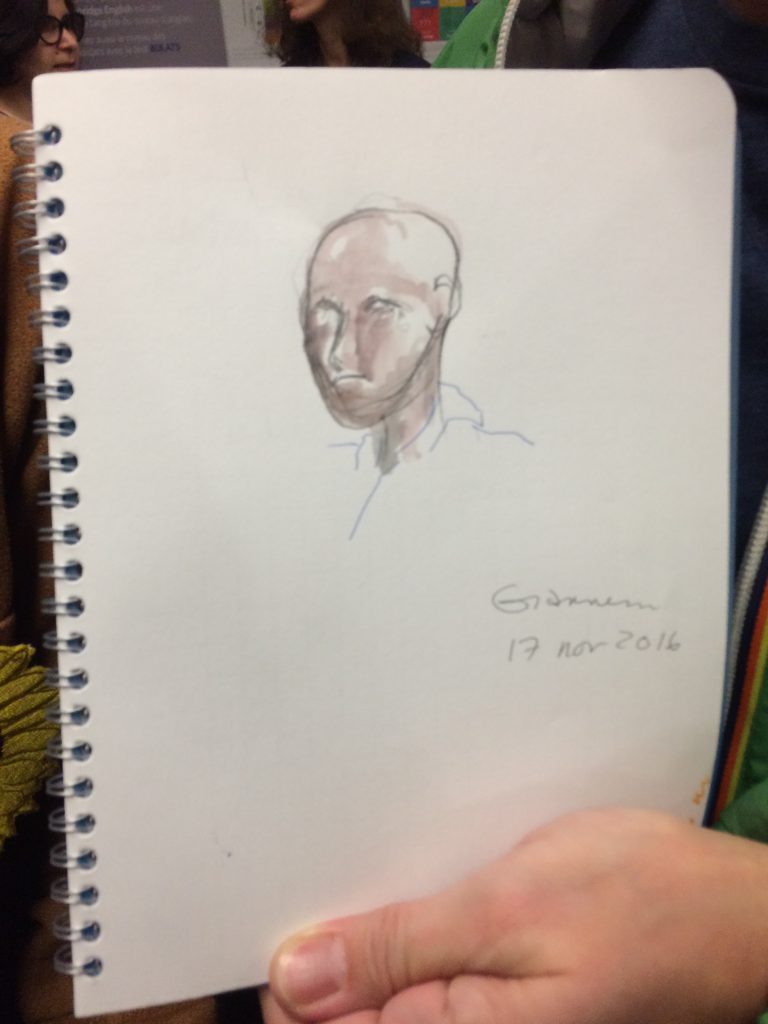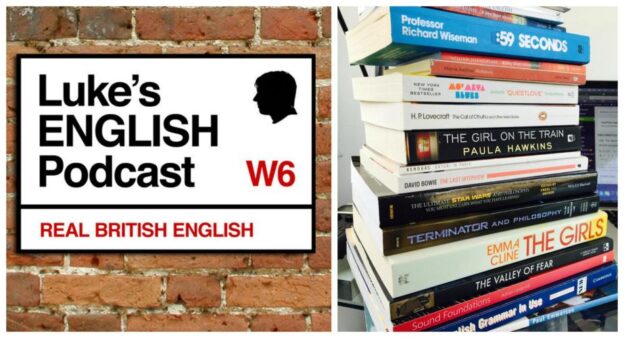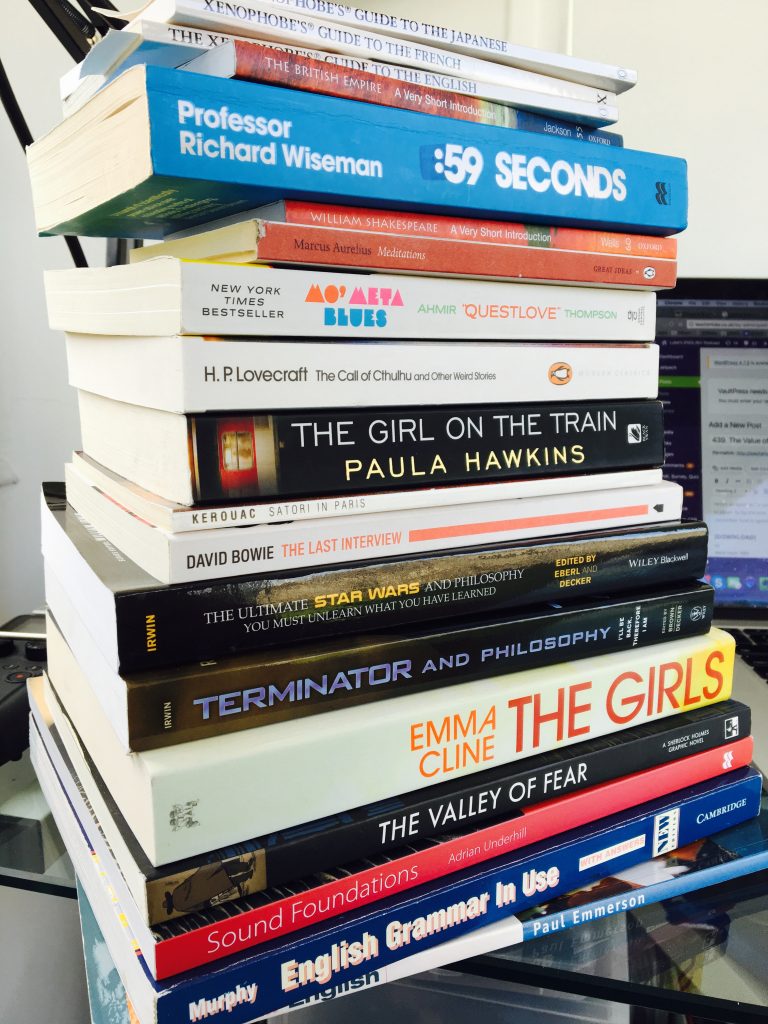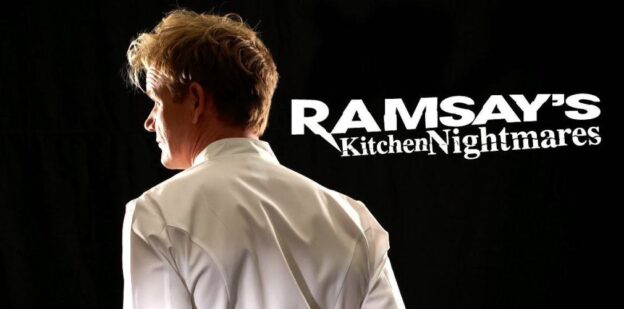Describing some thoughts about Japan after my recent visit. Exploring the culture and lifestyle in the Land of the Rising Sun.
![]() [DOWNLOAD]
[DOWNLOAD]
As you know I just came back from a little holiday in Japan that I had with my wife last week. We spent about 8 days there in total and I’m going to talk about it here because I thought you might like to know about the trip. You know, sometimes I do these episodes about travelling experiences that I’ve had and they seem to be quite popular. For example, I’ve done ones about going to India, Vietnam, Indonesia, New York, different parts of France, California and Thailand. In this episode (or these episodes) I’m going to do another one, this time it’s all about my recent trip to Japan from last week.
So, here’s another travel episode with a few stories, some descriptions of places, culture and experiences and other general ramblings about my reflections on the time spent in the land of the rising sun.
For the dedicated language learners and orion team transcribers, a lot of what I’m saying is written in the form of notes and I’ll put these notes on the page for this episode. So, you can read them and check any new words you hear, or if you’re transcribing this you can use my notes, copy them into your google doc and then just fill in the blanks – the bits where I improvise details and speak “off script” which I will probably do as I go along.
No idea how long this is going to take, but it’ll take as long as it takes. I’ll divide it into several episodes if it gets too long.
I’ve done at least one episode all about Japan before. That’s number 118 “Sick in Japan”(Full transcript)
It tells the story of how I ended up sick in a hospital bed in Japan more than 15 years ago, feeling physically terrible and mentally very panicked, not knowing what was wrong with me. Do you remember? If you haven’t heard it, I recommend listening – you might enjoy it! Basically, I got very sick there and spent two weeks (even before I went to hospital) essentially lying on my bed in my apartment at home getting more and more ill, unable to eat, unable to sleep even though I was very tired, in a lot of pain from a horrible infection. Eventually I got to a doctor who agreed to treat me and after taking a blood test he informed me in slightly broken English that I had liver damage, I needed to go to hospital and I needed an operation. To be honest, his diagnosis was a bit lost in translation and it wasn’t as bad as I thought but I assumed the worst! I thought I needed a liver transplant because I had some sort of weird liver disease! I remember the first night in the hospital bed feeling like I was going to die or something, not knowing what was wrong with me, thinking that I was going to be given an operation to get a liver transplant and the worst thing was that I worrying that they would give me a Japanese liver! For some reason this scared me because I thought “Maybe it won’t work with my body and maybe I won’t be able to drink beer like I could before!” That was the worst thing – I won’t be able to drink beer! Even if I survive! Weird paranoia and fear and ridiculousness. Naturally, it turned out ok in the end, and in fact it all turned out to be part of a really great adventure. That was one experience I had during the two years I spent in Japan in 2002 and 2003. To hear the whole story listen to episode 118. It also explains a lot of the reasons I went to live in Japan in the first place and what happened to me while I was there, especially the difficulties, even though the majority of my experiences were really great.
This episode
- Why did you go?
- What’s it like in Japan? Let’s explore the culture, the people, the way of life and the mentality etc.
- What did you do, where did you go and what did you see?
- How was your gig? Tell us about the comedy show you did.
Why did you go to Japan?
You might be thinking, “Why didn’t you come to my country Luke? My country is a wonderful place with many fantastic things to offer. Come, Drink our favourite drinks, eat our national dishes, let me sing you the song of my people!” I’d love to visit everywhere all the time of course! But this time, it was Japan – a place where I used to live and which I’ve always wanted to return to, for my own personal reasons.
I have a connection to the place. 2 years of my life there. I made strong friendships and became attached to some specific places and things. It was hard to break away from it when I left years ago. It was an important period so I still have a connection with Japan. When I originally left Japan I thought I would never go back. I remember looking around at the places I used to go and I’d think – I may never come here ever again. That’s a strange feeling actually. When I first went to Japan I was a bit depressed and lost to be honest. When I returned I felt much more confident and positive in many areas, including work, how to live, how to connect to people, even how to perform etc. When I arrived I was feeling that there wasn’t much I could do. Everything was negative and a bit difficult. When I left I felt like I could do whatever I wanted! The place really lifted me up. Also I learned about the kindness of people and about how to relax and look after myself in the middle of chaotic stress. It was a good time and a place where things changed for me a bit, so naturally I have a soft spot for the place.
Now it’s 15 years later and I’m married. My wife loves Japanese things, she loves travelling, and I love her so I wanted to show her this important place. That was quite important to me.
Birthday – my wife wanted us to celebrate, anniversary. It was a special occasion.
What’s it like in Japan?
In no particular order, here are some reflections on the culture, lifestyle, psychology and general feeling of life in Japan, especially Tokyo.
Crowded
About 130,000,000 people – more than double the number of people in the UK or France. Just under the number of people in Russia – but consider the relative space. Greater Tokyo has about 40,000,000 people, making it the most populated city metropolis in the world. But they make it work. Despite the large number of people, the place functions very efficiently. There’s not a lot of space but it’s amazing how interiors are designed to make the most of the space they have, and how everyone manages to keep everything peaceful and tidy.
Geography
The place is 70% mountain, so a lot of people are crammed into the city areas where it’s more practical to build. Also, the country sits on a whole series of fault lines which means there are regular earthquakes, more than a thousand in a year. Not all of them are noticeable, but many of them are. Mount Fuji is the biggest mountain in the country and it looms in the distance – sometimes visible from Tokyo, much more visible from areas in Kanagawa where you can see it from the beach or you get glimpses when travelling on the train, especially in winter when the air is clear and mountain is covered in snow. It’s a spectacular and beautiful sight – symmetrical, powerful, peaceful and majestic. It’s also an active volcano, which makes it seem a little threatening and powerful. If it erupted – it would be pretty devastating. https://qz.com/236129/what-would-happen-if-mount-fuji-right-next-to-tokyo-erupted-for-the-first-time-in-207-years/
I’m sure this has an effect on life there, but it’s kind of below the surface. I don’t know if Japanese people really think about it a lot, or whether it bothers them when they’re alone. I don’t really know. But there’s always this feeling of “the big one could come at any time” perhaps that contributes to the uniqueness, the energy, the weird zen-like feeling of the place.
Queueing and other forms of social order. Coming from France, where public moments of conflict are very common, Japan seems incredibly orderly considering the number of people living in quite a small space. I suppose this comes from necessity – that people need to be able to get along in order for the whole system to work. Generally, people respect each other’s personal space, there’s a lot of effort made to maintain the common good. It’s almost a subconscious duty to make sure you do your bit – don’t drop litter, don’t make loud noise, don’t take up too much space, be respectful to those around you. There’s a real sense of collective consciousness in Japan. In the UK, I remember coming back from Japan feeling that everyone seemed so individualistic and ego-centric. Also I was surprised by the way some of my friends behaved in an anti-social way – speaking loudly in public places, dropping cigarette buts outside doorways and so on. People also seemed to do a lot of talking about themselves. In Japan that seems to happen less, and it’s distasteful to talk about yourself too much. These are just observations I’ve had – I might be wrong about it all, and please correct me if I am, but I feel like Japan has more of a sense of collective consciousness, and collective duty and less individualism – that’s not to say people aren’t individuals, of course they are, but people seem to just pay more attention to things that will be for the good of everyone, and as a result the place is efficient, clean, tidy and peaceful.
The charisma man
I thought I’d talk about this now, since I’m on the subject of some differences between JPN and let’s say ‘western culture’. There’s this idea of the charisma man, which used to be a comic strip popular in the expat community. It’s quite interesting and a little bit controversial but it does tell us something about the way western people (especially men) can be treated in Japan, or at least one phenomenon which can occur (not necessarily every time with everyone). What’s a charisma man?
Wikipedia: Concept of the Charisma Man
“Charisma Man” manipulates the superhero genre to ridicule the often unjustified self–confidence of some foreign men in Japan. Although something of a loser in his home country Canada—the home of Charisma Man’s creator—when around Japanese people the central character transforms from a skinny nerd into a muscle-bound hunk, extremely attractive to women and admired by men. Like other superheroes, however, Charisma Man has one major weakness: “Western Woman”. Whenever in the presence of western females his powers disappear and he becomes an unattractive, skinny wimp once more.[2]
“Charisma Man” is thus a statement on the relationships between Japanese and non-Japanese in Japan. According to Rodney:
“The Japanese seem to see Westerners through some kind of filter. An obvious example was all the geeks I saw out there walking around with beautiful Japanese girls on their arms. These guys were probably social misfits in their home countries, but in Japan the geek factor didn’t seem to translate.
“The dichotomy between the perception of these guys in their home countries and in Japan was amazing to me. This made me think of Superman; on his home planet of Krypton, Superman was nobody special, and he certainly didn’t have superpowers. But when he arrived on earth — well, you know the rest.
“He was somebody — that was the whole premise of the first strip.”
— Larry Rodney, in a 2003 interview with the Japan Times
I still see Charisma men in Japan quite a lot. Imagine some western guy who is acting a bit arrogant and self-important when really he’s not that great. The inflated ego of a western man getting attention from Japanese women. Partly it’s a bit unfair to Japanese women, that’s what some people say. It shows two things – one being that there is a certain filter through which some Japanese people will view western men – i.e. that they see them as more impressive and charismatic than they really are (or perhaps they’re just being polite) but the other thing is the way some western guys react to the attention they get in Japan. Some blokes let it go to their heads and they end up being tiresome egomaniac would-be alpha males who let all the adulation go to their heads. This is probably why they’re not that popular in their own countries – they’re just not that nice or charming, and it becomes more obvious in Japan when you see the way these guys become smug, arrogant self-important guys with an inflated sense of ego.
It’s just interesting to note the way in which people’s perceptions of themselves and each other can change depending on the cultural context. On one hand this is kind of a bad thing, but on the other hand it’s what makes Japan so special – people do treat you well, it’s really nice to have people show interest in you and to be genuinely impressed by where you come from and to be impressed by the differences. E.g. when we told people we were from Paris and London – this seemed to be impressive information. It’s nice! I’d rather have that than be met with indifference. Even if it’s even a little bit fake (which I’m not sure it is actually – I think people are genuinely curious) even if it’s slightly fake, it’s better than genuine rudeness. So it’s a double-edged sword – it’s lovely to be considered as slightly special because you’re different, but that can go to some people’s heads and make them act a bit arrogant, it can also get a little tiring after a while when you just want to be considered as a normal person like everyone else. I remember that I used to get a little fed up with people immediately being impressed by me when they first met me. Like, “where are you from?” “I’m from London” “Oh you are so cool guy! You are a gentleman!” and I thought “Well, I’m not really. I’m just a bloke – not all that cool really, just normal, and not that much of a gentleman really.” In the UK we tend to be a little bit wary of those big compliments and in fact when you really get to know someone you tend to just take the piss out of them, even when you don’t know them and first meet them, you might take the piss quite a lot – it’s a form of bonding and friendship building.
Quietness & “zen” feeling
Japan is officially a peaceful country.
But it’s more than that. The place can be incredibly peaceful. I’m not sure where this comes from to be honest!
Service
Excellent – the customer is god. Polite in the extreme. Attentive. Generally everything is of high quality and you’re looked after well. Can be a bit robotic though, and I find that there’s a certain kind of high-pitched woman’s voice that you hear everywhere, from machines and announcements. Also there was an actual robot at the airport.
Cleanliness
You could eat your dinner off the floor. The metro is shiny and reflective. Many indoor places ask you to remove your shoes and this is an excellent idea.
There are no bins anywhere! But also no litter on the streets. Very few cigarette butts. They all go in little cigarette butt bins, or people put them in their own little portable ashtrays.
Aesthetics
A lot of natural forms. Not as robotic and futuristic as you might expect. There’s a lot of wood, lots of stone. Natural forms – imperfect shapes combined with symmetrical lines. Patterns, textures and surfaces which are imperfect. E.g. the texture of stone, or wood, or rough surfaces with random patterns and textures. The same kinds you find in nature, often combined – stone, wood, moss, water. Different textures next to each other, with natural lines, shapes very neatly presented. It’s extremely satisfying and peaceful, relaxing – Zen.
Cherry Blossom
This is one of Japan’s big moments in the year. There are cherry trees everywhere, especially in certain spots and when the blossom comes out in early April it’s a beautiful sight to see. It’s a delicate pink colour and it looks like snow all over the branches. It contrasts beautifully with the blue sky and when the wind blows the blossom falls from trees again like snow. It lands on the ground carpeting it and also on rivers. It’s fleeting, transient beauty of the highest order. Japanese people celebrate it by having little picnics and parties in the park in cherry blossom areas. Lovely.
Cuteness – “Fluffy bunny land”
Cuteness rules – “kawaii”
Examples: Everything has a cute logo, everything is anthropomorphised with a cute little face – bread, chicken shops, cash machines, safety rules. Everything has a cute melody – constant little melodies like the music that plays when the green pedestrian light shines, bus doors, bus stops, cash machines, some streets just play music from the lamp posts. It’s like Super Mario Land, it really is.
Everyone has cute bags, badges, pencil cases. Even the people are adorably cute. They’re quite small, sweet, laugh and giggle easily, are self-contained (neat and tidy) quite easily scared (I mean, a bit socially awkward and shy) often have quite big fluffy hair, round faces. Extremely cute and adorable, especially the kids. Basically, Japanese people – you’re like cartoon characters to me, or ewoks or teddy bears.
Is that fair? I don’t know. I don’t mean to sound patronising, but Japanese people can come across as cute in those ways. But are Japanese people like Ewoks? Maybe. I’m sure Japanese people are perfectly capable of being mean, nasty, cruel, selfish and everything like that – I’m sure I’m just applying a filter to them just like they might apply a filter to me. Who knows… But I quite like the Ewok metaphor. Ewoks are cute and loyal, but they can also be deadly can’t they! When you think about it – the ewoks are perhaps the most dangerous creatures in the Star Wars universe. They basically stopped the Galactic Empire and helped the rebels destroy the second death star. You wouldn’t want to have to fight against them would you, even if they do look like cute little fluffy bears. Also, if you remember, in Return of the Jedi the ewoks were originally planning to eat Luke Skywalker, Princess Leia, Han Solo and Chewbacca, until C-3P0 stopped them. They were going to eat Luke Han and Leia. They’re vicious carnivores! Don’t underestimate them. Anyway, what I originally planned to say was simply that Japanese people seem very cute to me and cuteness or (kawaii seems to have an important role in Japanese life).
Why is everything so damn cute??? Why is cuteness so important in the culture?
Paul Ratner from BigThink.com
While you may dismiss cuteness as a regional peculiarity, there is science to back up the unexpected usefulness of kawaii in life. A study by researchers from the University of Hiroshima did several experiments on students and found that their performance on a variety of tasks like fine motor dexterity and non-visual searches improved after viewing cute images of puppies and kittens. The scientists concluded that this is due to the increase in narrowing attentional focus that resulted from viewing the cute images. They advocated the use of cute images and objects in work spaces to improve productivity.
I often wonder how Japan manages to be so efficient, and I’ve always thought that there was just something in the air here which means that people find the most convenient stress free ways of getting on with things. Partly that atmosphere is created by just focusing on certain pleasing things and trying to stay calm at all times. I guess it’s similar to the way the Brits just keep calm and carry on and try not to let emotions stop you from just getting things done. In Japan they seem to emphasise the cuteness just because it makes you feel good, makes you feel protected, reduces stress and allows you to be more productive. Perhaps that’s because Japan is quite a stressful place when you think about it – the potential for natural disaster is quite high. If you think about it too much you could freak out a bit – tsunami, earthquakes, volcanoes, typhoons, Godzilla – they could all wipe everything out! Cute stuff helps you deal with that. Perhaps also the Japanese worship nature, like animals and so on – Shintoism believes in the gods of every creature or object, and you feel this level of respect in everyday life, kind of. It’s as if everything has it’s own Pokemon character which is both cute and potentially powerful and the Japanese are just in tune with all of that.
So, objects, animals and so on are given this cute personality just because this is the level of kind of respect that Japanese people attribute to things that in our culture would be basically meaningless. Maybe I’m wrong about that, if so – let me know what you think. Why are the Japanese preoccupied by cuteness? Are they the only ones?
Yumi Nakata from GaijinPot.com – 3 reasons
Reason 1: Kawaii usually refers to small children, babies and small animals. They are helpless and need to be cared for. In a culture that values youth, both men and woman are attracted to anything youthful. Women want to appear youthful and Japanese men are attracted to young girls, just look at the popularity of bands like AKB48.
Reason 2: Japanese people work very long hours and they are under enormous social pressure. Cuteness is the total opposite of Japan’s harsh reality. My sister who works in IT says she enjoys going to stores full of cute products especially after working long overtime hours. Cuteness is cool and soothing for Japanese people and allows them an escape from the realities of their life.
Reason 3: Japan is collectively a society with a 12 year old’s mentality and for many there is a strong resistance to grow out of this prepubescent stage. As adults Japanese people are expected to conform to strict social norms and expectations. However as I mentioned above, children are always taken care of in Japanese society. Therefore to cope with the harsh realities of adulthood, many Japanese people seek the comfort of cuteness.
End of part 1 – Part 2 coming soon.











